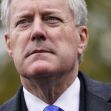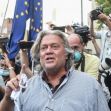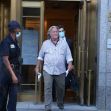After publicly vowing to strongly fight charges of Contempt of Congress, former President Trump’s White House Chief Strategist Steve Bannon, 68, was found guilty quickly, of two counts of contempt, in under three hours. Bannon was found guilty of Contempt of Congress in a Washington, D.C. federal court last week for deciding not to comply with the January 6 House Select Committee’s subpoenas in regards to the deadly January 6 insurrection on Capitol Hill in 2021.
“The subpoena to Stephen Bannon was not an invitation that could be rejected or ignored,” said Matthew M. Graves, U.S. Attorney for the District of Columbia. “Mr. Bannon had an obligation to appear before the House Select Committee to give testimony and provide documents. His refusal to do so was deliberate and now a jury has found that he must pay the consequences.”
The trial by jury was handled by U.S. District Court Judge Carl Nichols.
In her closing arguments against Bannon, Prosecutor Molly Gaston told the jurors that he “chose allegiance to Donald Trump over compliance with the law.”
Bannon’s refusal to comply with the Committee to testify landed him a guilty conviction, and he now faces up to two years in jail. He announced he will appeal.
“This is round one, that’s what happened,” said Bannon’s attorney David Schoen after the verdict. “This is a bulletproof appeal."
But between the bookends of Bannon’s public vow not to testify in the House Committee Panel investigating the January 6 riots and the speedy guilty conviction in this case, something surprising occurred. Trump did not return this allegiance to his former White House strategist.
On July 9, 2022, Trump sent a letter to Bannon and his attorney Robert Costello, saying said he would waive executive privilege in regards to Bannon. The letter stated Trump had "watched how unfairly you and others have been treated (by the) "Unselect Committee of political Thugs and Hacks.”
It was then that Bannon decided it would be in his best interest to comply with the original subpoena to testify. However, it was too late.
After receiving Trump’s letter, Bannon’s attorney told the chair of the Committee, Representative Bennie Thomas, that Bannon did not have a “change of posture or of heart.” Instead, Costello noted, "circumstances have now changed” after Trump announced he would waive executive privilege for his former White House strategist.
Contrary to expectations by Trump followers, Bannon fans and Bannon himself, Trump’s attorney Justin Clark told said the past president “never invoked executive privilege over any particular information or materials” involving Bannon.
Trump, as the Department of Justice (DOJ) further confirmed, did not invoke executive privilege with regards to his former White House Advisor, Bannon.
At first, the Committee requested Bannon’s testimony to learn more about his contacts and work with Trump amid the former president’s relentless efforts to overturn his legal defeat in the 2020 presidential election.
Bannon’s attorneys presented a myriad of legal arguments during the trial, from trying to get a hung jury to attempts to win an acquittal and even wild allegations that a signature on the subpoena was forged.
One of Bannon’s defense lawyers showed the court numerous letters as so-called proof that committee chair Bennie Thompson’s signature on his subpoena might be a forgery.
Bannon’s attorney Evan Corcoran, showing the letters, said, “You can ask yourself if one of those things is different than the other. That could be a doubt as to the government’s case, a reasonable doubt as to whether Chairman Thompson signed this subpoena. If you’ve got a doubt in your mind, you’ve got to give Steve Bannon the benefit.”
The jury was not convinced of any forgeries.
The prosecutor told the jury that Bannon was looking for excuses to defy the law.
“How convenient that the former president chose to give the defendant an excuse for his defiance,” said prosecutor Vaughn.“The defendant stood with Donald Trump and that choice, the deliberate decision to stand with former President Trump, that is a choice — the deliberate decision to defy the subpoena.”
In a further show of rebelliousness, neither Bannon nor his lawyers stood up as the foreperson of the jury read aloud the two verdicts.
“The tenets of our government rely upon citizens adhering to the established rules of law. Lawful tools, such as subpoenas and other legal orders, are critical in our system of government,” said Steven M. D’Antuono, Assistant Director in Charge of the FBI Washington Field Office. “Mr. Bannon was found guilty of contempt by a jury of his peers for his choice to ignore a lawful subpoena. The FBI will continue our sworn duty to investigate those who have committed violations of our laws and hold them accountable for their actions."
Sentencing for Bannon is planned for Oct. 21. Bannon is free until sentencing.






